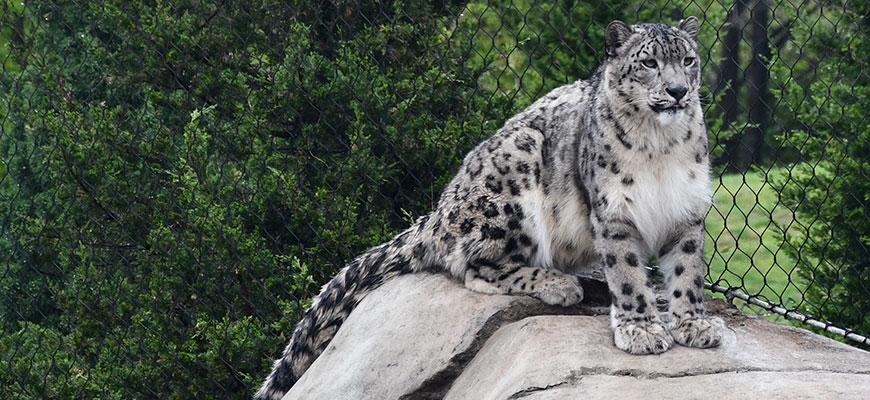CONTACT: Kyle Shepherd
502-238-5331 (Media Cell 502-744-5639)
kyle.shepherd@louisvilleky.gov
LOUISVILLE, Ky. (January 14, 2021) – After a month off exhibit while recovering from SARS-CoV-2, the virus that causes COVID-19 in humans, the Louisville Zoo’s three snow leopards are clear of the virus and will return to exhibit rotation. No other animals are showing symptoms at this time. Five-year-old NeeCee, a female snow leopard at the Louisville Zoo, tested positive for SARS-CoV-2, in December. The two males, Kimti and Meru, were subsequently confirmed
Since early December, daily fecal samples from all three snow leopards were collected and tested for the presence of the virus. Clinical signs by the cats were mild and ceased early in the month of December, however, fecal shedding of the virus persisted a few weeks longer.
Senior Staff Veterinarian Dr. Zoli Gyimesi said this is “typical of how the virus has behaved in other big cats. We are happy to end their quarantine and get them back to enjoying the exhibit.”
The snow leopards were tested for SARS-CoV-2 with approval by state officials from the Kentucky Department of Agriculture and the Kentucky Department for Public Health. Genome sequencing of the virus, isolated from the snow leopards by the Veterinary Diagnostic Laboratory at the University of Illinois, confirmed that it was a human strain. This supports the suspicion that the cats were infected by an asymptomatic staff member, despite precautions by the Zoo.
All three cats presented with mild symptoms of a dry cough or wheeze. The snow leopards were quarantined off exhibit while they recovered. Keeper staff who work with the snow leopards were required to wear enhanced personal protective equipment (PPE) in addition to the PPE that was already in place.
Based on current knowledge, the risk of infected animals, including the snow leopards, spreading the virus to humans is considered low. COVID-19 remains predominantly a disease transmitted from person to person.
All Zoo staff are following COVID-19 safety protocols recommended by the Centers for Disease Control and Prevention (CDC) and Louisville Metro Department of Public Health and Wellness. All Zoo staff go through a detailed health screening before starting their workday, wear appropriate PPE based on their job, and are tested if symptoms of COVID-19 arise. The Zoo continues to follow all necessary safety precautions as issued by the CDC and Metro Public Health and Wellness. Last April, keeper staff working with cats, non-human primates, bats and ferrets, began wearing PPE when near the animals.
This was the first confirmed case of SARS-CoV-2 infection in a snow leopard. The discovery contributed to the growing knowledge about this novel coronavirus and transmission between people and animals.
The USDA keeps a list of confirmed cases in animals, and in Kentucky to date, there has been one confirmed case of SARS-CoV-2 in a domestic cat. For more information on how to prevent COVID-19 in people and animals, visit the CDC webpage.
About the Louisville Zoo
The Louisville Zoo, a nonprofit organization and state zoo of Kentucky, is dedicated to bettering the bond between people and our planet by providing excellent care for animals, a great experience for visitors, and leadership in scientific research and conservation education. The Zoo is accredited by the Association of Zoos and Aquariums (AZA).
# # #

